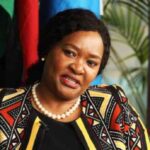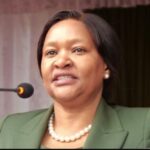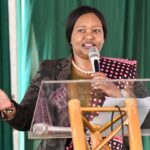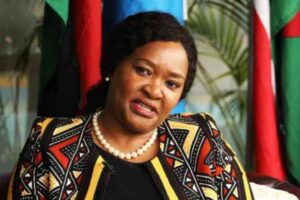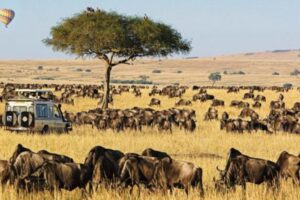[ad_1]
MS FITZSIMMONS: Mr. Secretary, it is my pleasure, my sincere pleasure, to welcome you to the Africa Bureau family, and virtually to U.S. Missions Nigeria and Kenya. My name is Elizabeth Fitzsimmons, and I’m the acting principal deputy assistant secretary in the Bureau of African Affairs. I have the pleasure of moderating your town hall this morning with our staff posted in Abuja, Lagos, and Nairobi. We’re grateful that you can spend this time with us, and we look forward to a vibrant exchange.
As we begin, I’d like to please introduce my chiefs of mission, my colleagues. So I’ll begin, Mr. Secretary, with introducing you to U.S. Ambassador to Nigeria Mary Beth Leonard.
AMBASSADOR LEONARD: Hello, Mr. Secretary, and welcome to Nigeria.
SECRETARY BLINKEN: Great to see you, Mary Beth.
AMBASSADOR LEONARD: Hey, first I’d like to take the opportunity to introduce you to our consul general in Lagos, Claire Pierangelo.
MS PIERANGELO: Good morning, Mr. Secretary.
SECRETARY BLINKEN: Claire, good to see you.
MS PIERANGELO: Good to see you, sir. Really pleased to see you as well. So as we say in Nigeria, you are welcome. Greetings from one of our largest consulates in the world, with our team of local staff, Marines, seven agencies, and all our family members. We are here to take care of America’s business at the consulate general in Lagos. So Ambassador Leonard, thank you, and back to you.
AMBASSADOR LEONARD: Thank you so much, Claire. And once again, Mr. Secretary, the warmest of welcomes to Mission Nigeria. We are one 2,250 employees, American and locally engaged, from 12 agencies, and ably supported by our families, who sustain us. On the Nigerian side, our colleagues come from every one of Nigeria’s 36 states and the Federal Capital Territory. In the United States, we come from 43 states, two territories, and D.C. And we are all so proud to represent the United States to sub-Saharan Africa’s giant. This country has the biggest economy, the largest population. It’s the largest democracy. And we know that our work saves lives from hunger, from illness, from violence, and thereby reducing threats to the United States from international terrorism and border-ignorant health risks.
We know that we are partners in creating shared prosperity between the United States and Nigeria. They’re our second-largest trading partner. More Nigerian students study at colleges in the United States than from any other country in Africa, and they send about a half a billion dollars a year in their universities and surrounding communities across our country.
Our commercial interests are helping to drive the diversification and growth of Nigeria’s economy, particularly in areas like IT and power and agriculture, and usually in ways that help drive down climate-damaging emissions.
And more to the – also we’re here at a time when this African giant is reasserting its preeminence in African and worldwide multilateral fora, at the same time that the U.S. is re-engaging in this spheres with new energy and optimism.
So Mr. Secretary, for all these reasons, thank you so much for coming to visit us and taking some time in our world. We’re so looking forward to hearing from you, and we hope you’ll enjoy the rest of your stay with us. Thanks so much.
MS FITZSIMMONS: Thank you so much, Ambassador Leonard. Secretary Blinken, we’re going to whisk you virtually now over to East Africa. I have the pleasure of introducing my colleague, the charge d’affaires at U.S. Embassy Kenya, Eric Kneedler.
MR KNEEDLER: Morning, Mr. Secretary.
SECRETARY BLINKEN: Eric, good to see you.
MR KNEEDLER: Great to see you as well, and on behalf of the 1,800 people and 34 agencies and offices represented here at Mission Nairobi, I’d like to offer you a warm virtual welcome to Kenya. Mission Nairobi is your largest embassy in the Africa Bureau, and we’re proud of the work our diverse and talented team carries out on behalf of the American and Kenyan people. Mission Nairobi stands shoulder to shoulder with our Kenyan friends countering terrorism, creating jobs for both of our countries, battling infectious disease, and expanding the deep and enduring people-to-people ties.
Mr. Secretary, I know you need no further introduction, but with your permission I’d like to add one more biographic note for the benefit of our community. While I think most are aware this is our first town hall virtually with the Secretary of State, they’re probably not aware that this is also our first town hall of any kind with a musician you can actually listen to on Spotify. (Laughter.) It’s a true story. You can access the Secretary’s music on Spotify under Ablinken. That’s a-b-l-i-n-k-e-n. And since it is now nearing the end of the day here in Kenya, I hope our town hall viewers can enjoy a few of the Secretary’s songs. So with that, Mr. Secretary, I’d like to thank you once again for taking the time to be with us today and turn it back over to Elizabeth.
MS FITZSIMMONS: Thank you so much, Charge Kneedler. Secretary Blinken, the floor is yours.
SECRETARY BLINKEN: Well, thank you all so very much. And Eric, if I notice a dramatic spike in my Spotify account from zero to three or four listeners, I’m going to know where it’s coming from. So I thank you and I just want to assure everyone listening in today that that wasn’t a setup, but I would also suggest that you may find other, better venues for listening to music, especially to start the weekend.
But in all seriousness, it’s wonderful to be with everyone, and there is at least one benefit to having to meet virtually: We can all be together in one very big town hall meeting. I suspect we’re also going to give new meaning for this virtual visit to what a wheels up party is all about. I don’t know if we need to change the terminology. Do we call it a satellite down party? We’ll have to figure that out at some point.
But I really do want to start by thanking a few people, thanking our Charge d’affaires Eric Kneedler in Nairobi, Ambassador Mary Beth Leonard from Embassy Abuja, and Principal Officer Claire Pierangelo from the consulate general in in Lagos. Thank you, thank you, thank you. And Elizabeth, thank you to you, our acting PDAS from the African Affairs Bureau, not just for serving as our emcee today, but for serving in a sense as our emcee every day in carrying out the extraordinary mission that we have in American engagement with Africa. I also very much want to thank three site officers who made the town hall possible: Samuel Aronson in Abuja, Bill Bridgeland in Lagos, and Christopher Estoch in Nairobi. Thanks to all three of you. Thanks to everyone who’s been able to help us put this together.
It means a lot to have this chance to connect with so many members of our missions overseas. Whether you’re a direct hire, a contractor, locally employed staff, or a family member; whether you work for the State Department or one of the many other U.S. Government agencies represented here, from DOD to the CDC to USAID, I’m deeply grateful for your service. And I have to tell you it’s not an accident that I am making this virtual trip to Kenya and Nigeria near the start of my time as Secretary. Our administration, the Biden-Harris administration is committed to elevating and increasing our engagement across Africa. We’re reinvigorating our diplomacy, restoring respectful engagement with our partners, reaffirming our support for democracy and economic growth across the entire continent.
And as part of this virtual trip, I’m meeting with representatives from the clean energy sector in Kenya and with young people from several countries through YALI, because the rising generation of African leaders literally will shape the future not just of their countries but, I believe, of the world. I have a chance to visit with health experts and patients in Abuja because public health is a significant component of the partnership between Nigeria and the United States, especially during COVID-19.
I’m also meeting with Nigerian and Kenyan senior officials because our governments work together closely on so many issues that all of you are engaged in every day, but most important, working together on issues that are actually critical to the people of our respective countries, that are having an impact on their lives.
I know that many of you have done a lot of work – often late into the evening – to make these events happen. And so I just want to say thereto thank you very, very much. This itinerary represents just a small fraction of the work that you’re doing every day in Nairobi, in Abuja, in Lagos to advance American interests, to build cooperation between our countries, and to represent our values. These are vital diplomatic relationships, and the fact is you’re the ones making them possible.
Even at a less eventful time, I know the work you do is often very challenging, and then comes COVID-19 to make your jobs even harder. We’ve lost people dear to us, and I know, for example, that includes George Kamau, who served as the director of the Information Resource Center and the American Center at Embassy Nairobi for 20 years. We’re so grateful for his dedication and support, and I know that his memory will long, long endure.
We had the recent news of the death of a member of our State Department family on temporary assignment in Kenya, which is deeply saddening and distressing, and a reminder of how important it is for us to be there for each other and to seek help if we need it without shame. The global authorized departure policy meant that many of you were separated and isolated from your family members as well as from each other, and Kenya is dealing with heightened security concerns. In Lagos and Abuja, your movements outside the city centers are restricted, now even more so.
In short, none of this has been easy. In the past few days as I’ve plunged into this virtual trip, I’ve learned a little bit more about the culture of your missions, and culture is so important to the missions and to our department as a whole. I’ve heard about the Boatsy Ross and the Foggy Bottom boats that some of you take to work in Lagos. I’ve heard about the magnificent locally employed staff choir in Nairobi, which I hope to actually hear, and the recycling program at Embassy Abuja that helps send at-risk kids to school.
But most of all, what I’m hearing across the board is about your perseverance and commitment. You’ve kept essential work going throughout the pandemic. You’ve helped Americans get home. You’ve helped mission personnel stay safe. It’s really remarkable, and all of us back here at home deeply appreciate it.
In my first remarks as Secretary, I said that we have some work to do across the department to build trust and morale. We’ve got to do a better job listening to the people of the State Department when we’re making policy. We’ve got to invest in diversity and inclusion. We’ve got to build a workplace culture of collegiality, teamwork, respect. And I want to be clear: That doesn’t just apply to Washington, D.C. It applies to you and all your colleagues in embassies and consulates around the world. We are all a part of this community, and I’m committed to doing everything that I can to support you, to support your work, to support your families.
So thanks again for the work you’ve done just to make this virtual visit to Nigeria and Kenya a success, but especially for the work you’re doing every single day to serve our country, to serve the American people.
[ad_2]
Source link

